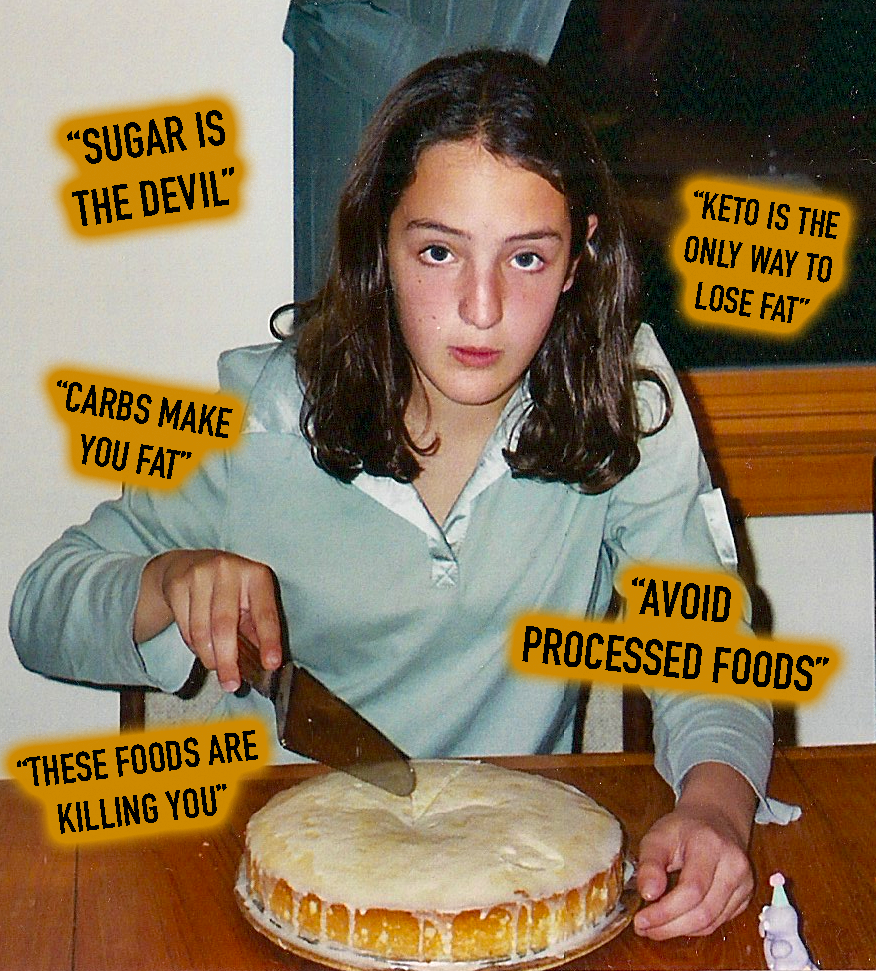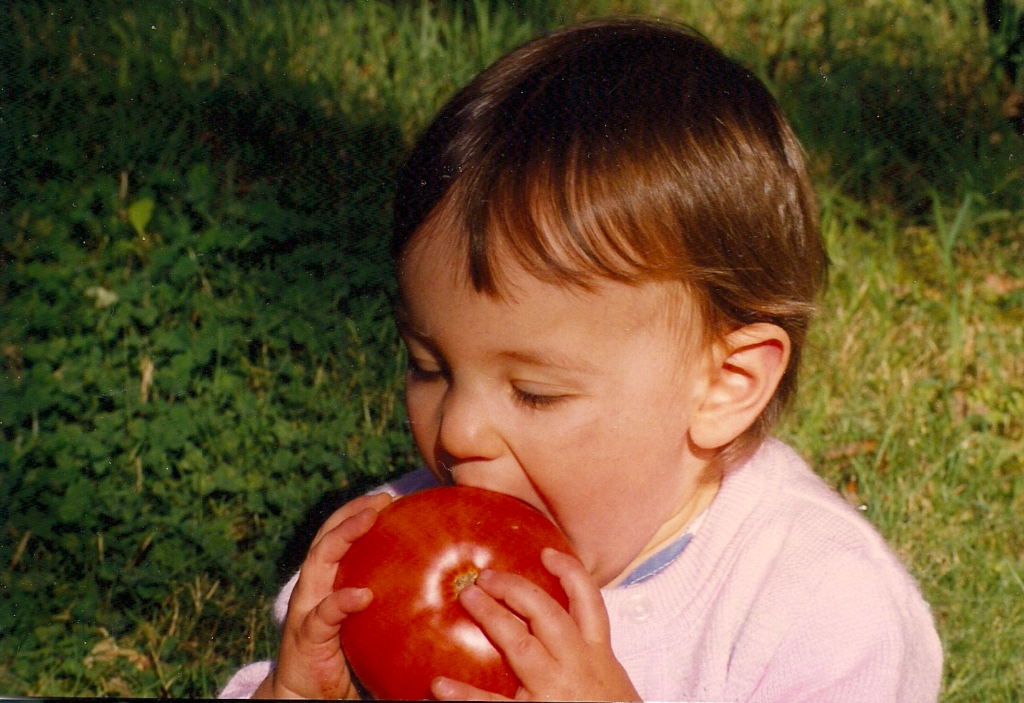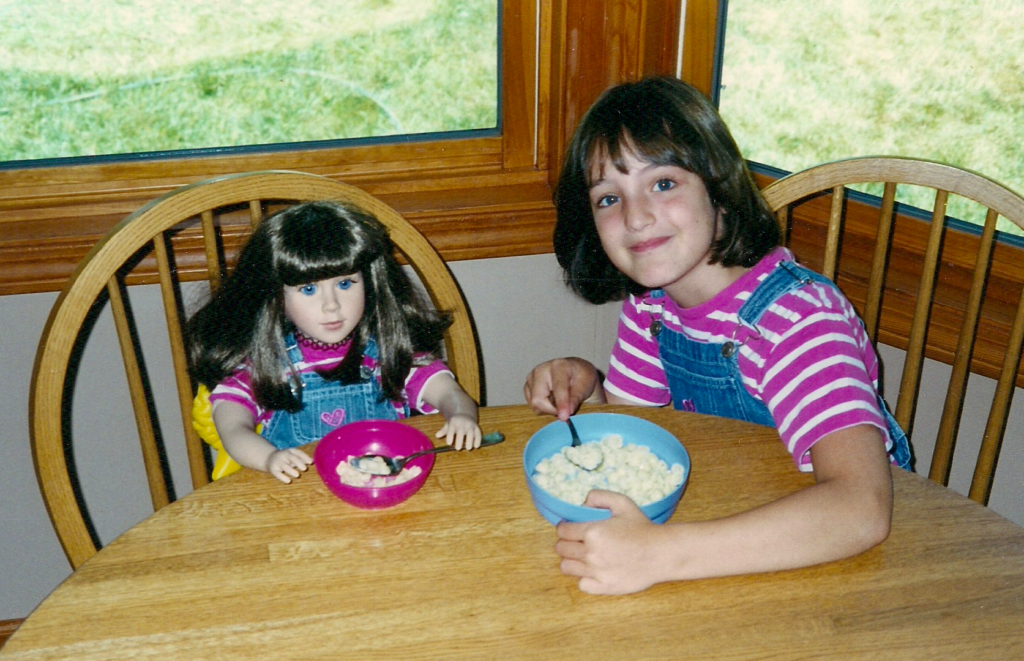
How do we identify reliable nutrition information, and why is it so difficult?
When I was first working to overcome binge eating disorder, I realized I had no clue what I “should” be eating to optimize athletic performance and maintain a healthy lifestyle.
Researching this was no help whatsoever. Here’s what happened.
1. Someone I knew was seeing a naturopathic doctor who was encouraging a high-fat diet, so I wondered if I should try it. It was the keto diet, though I never heard that word back then. Full-fat dairy, eggs, thick slices of REAL bacon (I grew up eating turkey bacon, so this was new), cheese, nuts, and avocados. Except…carbs were out. Many of my staples – pasta, brown rice, oatmeal – nope. No beans or corn. And no fruit, which shocked me.
I was confused. It was supposed to be an “all or nothing” strategy. So what if I included high-fat foods, but still ate carbs? Would I gain a bunch of weight?
2. I heard somewhere that “natural” foods were always the best choice. I shouldn’t have anything processed, and organic was always the way to go.
All this did was make me self-conscious as I stood in the middle of the grocery store and compared, like, seven brands of the same product because I was trying to find the one with the fewest ingredients. It also made me second guess eating out because I had no idea what I was being served.

3. I heard the phrase “sugar is the devil” and I quickly explored the internet for advice. What was I told I shouldn’t eat? Ripe bananas, corn, corn chips, potatoes, potato chips, and many other fruits.
I was appalled. I also fell for it and became afraid of sugar. I forced myself to eat bananas before they ripened fully, which I didn’t prefer. I also pulled a bag of corn chips out of my cabinet, saw that the nutrition label showed 0 grams of sugar, and became thoroughly confused. I felt guilty for eating a protein bar the previous day that contained added sugars and thought maybe I should stick to making smoothies, and then I realized there was sugar in my smoothie ingredients like fruit and Greek yogurt. Then I just felt totally lost.
4. My mom learned she was intolerant to gluten, so she stopped eating it and felt much better. I didn’t have any symptoms, but I wondered if that would be a good idea, also because I read somewhere that EVERYONE would be better off without gluten, not just those intolerant or with Celiac Disease. My biggest binges tended to be on baked goods at family parties, so I thought maybe if I cut out gluten, I’d stop bingeing.
So I tried cutting it out. As a lifelong pasta enthusiast and a firm lover of my dad’s homemade bread, this was atrocious. I suddenly had to become hyperaware of ingredient lists before eating anything, and so much of what I loved was no longer an option. I failed several times at making gluten-free versions of pancakes and biscuits. And yes, I overate less at parties because that stuff was just off limits. But really, that didn’t help, because I was sad I couldn’t eat the delicious food. I’d go home and binge on peanut butter instead.

5. The internet informed me that soy was “bad.” That meant I could no longer use the protein powder I enjoyed. I wondered if I should switch to whey protein, but I thought I’d heard that dairy wasn’t great, either.
So I looked it up.
6. The internet informed me that dairy was “bad.”
…and my head exploded.
How the f*ck are we supposed to figure out what advice is legitimate if everyone is contradicting one another?
This article ISN’T about sharing with you what’s true and false about specific food claims. I did bust several common nutrition myths in this article if you want to check it out. I also shared some tips on red flags in nutrition programs in my article about New Year’s Resolutions, here.
Instead, I want to give some tips on what to look out for to determine if maybe whatever advice you’re reading isn’t backed by science and isn’t legit, or if it’s at least worth doing additional research rather than taking it at face value.
These tips can apply to any form of content or marketing, like a website article, YouTube video, Instagram post, promotional email, presentation, or whatever you may come across. But for the sake of brevity, I’ll refer to any of the above as “content.”
So: what can you look out for?

1. Content that demonizes certain foods, uses polarizing language, or lacks nuance
There’s a company from which I buy a type of delicious nut butter. I love the nut butter, but I’m not a fan of their promotional emails. Their products are peanut-free, and I’ll get emails telling me to throw away my peanut butter and buy this stuff instead, and that peanut butter is full of added sugars and oils so it’s a terrible choice compared to the products this company sells.
First of all, you can buy peanut butter without added sugars and oils, if that’s what you prefer. Second, the only thing that would make peanut butter “bad” is if you’re allergic to it.
Sure, the company makes pretty tasty stuff. But telling customers their products are inherently better than those with peanuts is just misleading.
This is what’s known as fearmongering. Content creators deliberately evoke fear in their audience to get them to buy their stuff or eat a certain way.
I see a lot of content nowadays about how you need to avoid certain ingredients because they will “KILL YOU.” That’s certainly a reason to be afraid. But these people aren’t actually explaining anything about the product or backing up their claims. Let’s take sugar, for example. I see claims that sugar is killing you slowly, or it’s roping you in with its so-called addictive properties, or it’s all immediately being stored as fat.
Pay attention to the language used here. Look for strong words like “kill,” “toxic,” and “poison.” Look for polarizing words like “good” and “bad.”
Moreover, pay attention to the delivery of the message. Let’s say that it IS true that every time you eat sugar it’s contributing to your imminent death (it’s not), and I wanted to share this with my audience. I might come up with something like, “Unfortunately, due to [insert actual science explanation here about why sugar is doing this], it might be best to limit your intake as much as possible for your health and safety.” I would NOT say that “sugar is TOXIC and is DESTROYING YOUR INSIDES and is the WORST POSSIBLE THING YOU COULD PUT IN YOUR MOUTH BLAH BLAH BLAH.”

There’s also absolutely no nuance whatsoever in these claims. To stick with the sugar example, there’s no discussion regarding the quantity of sugar, frequency of sugar intake, how sugar is processed in the body, or when high-sugar foods can be quite beneficial (athletes fueling their training or races, for example).
It’s one or a few bold claims meant to scare the sh*t out of you, especially combined with the dramatic delivery using harsh language. And all that does is foster a disordered relationship with food. Now you’re terrified of sugar, so you try to avoid it. But avoiding it means you start to crave it, and then you binge on it. Then you feel guilt and shame because you think you’re destroying your insides. Repeat cycle.
Including nuance is one of the reasons I prefer creating longform content on nutrition, like this article, over short Instagram posts with a caption character limit. The answers to most nutrition questions aren’t straightforward. For example, if you checked out the nutrition myths article I mentioned earlier, you’ll see that some of those myths don’t have a “true” or “false” answer; rather, it’s something like “not necessarily.” Then I go on to discuss the nuance of it, such as talking about how sure, striving to eat mostly whole foods is a solid goal, but that doesn’t mean processed foods are the devil and should be avoided, and here’s why, and so on.
That’s nuance. Because I don’t want anyone to be afraid of processed foods or any foods like I was throughout my research years ago.
2. Content that reels you in with the promise of revealing a secret or a solution but leaves you hanging
The other week, I was researching something and clicked on a link for an article that was supposed to give me an answer. Instead, it turned out to be a massive article that went into extreme detail about the topic but continually did NOT reveal the answer. Every couple of paragraphs, it’d say something like, “Read on for the solution!” or, “We’ll tell you the answer…coming up!”
The worst part? I finally got to the bottom of the article, and instead of being enlightened, I learned I had to sign up for their email and text list, and THEN I’d be sent the information I was looking for.
That’s really obnoxious.
Even worse if this has happened to you with something related to nutrition, and the “answer” ended up being to buy that person’s special pill or formula.
Now, if all you have to do is enter your email to be sent a PDF or something, and the PDF is legitimate and helpful, that’s one thing. That’s just a marketing tactic. But making the audience read or scroll through pages and pages of filler text with continual promises of the elusive magical answer is taking it way too far.
Anything that isn’t actually sharing information with you and is instead inviting you to stay tuned for the special reveal, à la “but wait; there’s more!” is gimmicky and probably not reliable information.

3. Content that speaks of a “magic” cure or tells you that this method is the correct or only one
There’s no magic pill for health, fat loss, or nutrition in general. There are no shortcuts. Achieving a healthy lifestyle (whatever that means for you) or successfully losing fat takes work and dedication. There’s no easy way out.
Think about it. If there were one magic solution that actually worked, everybody would be doing it, and nobody would be struggling.
There’s also no “one size fits all” for nutrition. There is no “best” diet or “most effective” diet (and when I say “diet” I’m just talking about one’s overall eating habits, not like “going on a diet” to lose weight). What works for your friend might not work for you. What worked when you had a flexible schedule might not work now that you have a new job and kids.
If someone is telling you that their method is the ONLY way to eat or to lose fat, it’s BS.
I eat mostly plant-based foods, but that doesn’t mean I believe it’s the best way to eat. I spoke with a plant-based doctor about it once, and she told me that I should strongly consider going 100% vegan to eliminate all of the supposed inflammation in my body from the eggs and cheese I still included. She told me, “There just really isn’t anything good about eggs.” This is a biased way of thinking and left me with an uncomfortable feeling, and I found myself unable to fully trust what she was saying for the rest of the session.
I’ve had a couple of nutrition clients tell me they heard intermittent fasting is the ONLY way to lose fat. Might it help some folks lose fat? Sure. But not because it’s inherently better or has any tricks. It’s just another tool to help achieve a calorie deficit, and it might work better for someone’s schedule.
Nutrition is individualized. There are many, many ways to achieve a diet and lifestyle that works for you. If someone is advertising that their belief is the one true solution and everyone else is wrong, be skeptical.
4. Content that makes claims that sound too good to be true (they probably are)
This one overlaps with some of the above points, and it’s a good general guideline. A magic pill that will melt away fat in just a few days? The only method for fat loss that works? A quick solution that’s so easy you won’t believe you haven’t tried it before?
If it sounds too good to be true, it probably is.
This stuff is meant to excite you. It’s enticing, because who doesn’t want a super quick fat loss solution or one pill to solve all of your problems?
Remember, quick and easy isn’t sustainable. The stuff that DOES work for fat loss – consistency, hard work, sustainability, patience – is not flashy and enticing. Of COURSE we’d rather go for the flashier options. But it’s only going to confuse you, damage your relationship with food, and keep you on the hamster wheel of losing and regaining weight and going nowhere.
One last thing: keep in mind that a single source can provide both reliable and non-reliable information. Just because you agree with one point someone makes doesn’t necessarily mean every single thing they say is legitimate, and vice versa.
For example, maybe there’s a supplement company selling very high-quality protein powders. They’re transparent about their ingredients and third-party testing, they offer many options (whey, soy, pea, etc.), and they don’t try and claim one kind is better than the other. But maybe they also sell fat-burning pills, which turns you off. That doesn’t mean they’re a terrible company or that ALL their products are no good. You can buy the protein and ignore the pills. Kind of like how I still buy those nut butters even though the anti-peanut emails irk me.

If you’re incredibly overwhelmed by the conflicting information you’re receiving about nutrition, you’re not alone.
No one is going to agree on every single point. That’s life. Moreover, what we know about nutrition continually evolves as new scientific research emerges. So navigating nutrition content is always going to be a challenge.
Hopefully, these tips will help you better analyze what you read or hear, do further research, and determine if a piece of content may or may not be trustworthy.
Happy researching!
-Dina
Dina Grimaldi is a triathlon & nutrition coach who helps athletes reach their goals while finding the balance they need to fit training comfortably into their lives, and who guides and supports those with nutrition or health goals to cultivate a lifestyle of sustainable habits and a healthy relationship with food.
